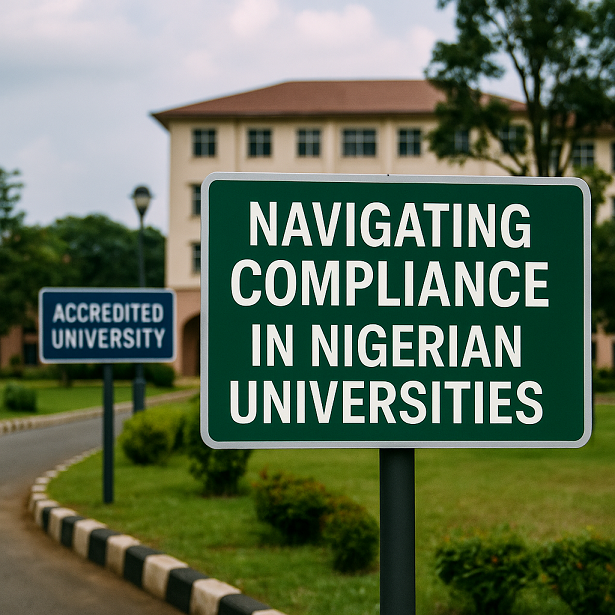As Nigeria’s tertiary education sector faces increasing scrutiny and reform pressure, university leaders and deans of business schools need a compliance guide for a structured compliance strategy. Regulatory expectations are growing for existing universities and business schools, especially those operating in commercial hubs like Lagos, Port-Harcourt, Kano, and Abuja across the federal, State, and Local Government jurisdictions. Schools must ensure institutional credibility sustainably. In this note, our education lawyers outline a practical, multi-tiered framework for navigating Nigeria’s compliance landscape while preserving academic excellence and institutional integrity.
Multi-Level Regulatory Ecosystem
In any case, the compliance regime of universities and business schools is not limited to the federal government. Institutions must simultaneously engage local government authorities, state-level agencies, and federal regulatory bodies such as the National Universities Commission (NUC).
| Level | Examples of Requirements | Regulators |
| Local Government | Business Premises Permit, Radio/TV License, Waste Fees | LGAs, LAWMA (Lagos), LG/LCDA offices |
| State Government | Signage Permit, Fire Safety Certificate, Building Permits | State Fire Service, Physical Planning |
| Federal Government | NUC Accreditation, JAMB Recognition, Taxes, NDPC Compliance, HIV/AIDS Workplace Policy, Disabilities and Accessibility, Intellectual Property Protection, Students’ rights/consumer protection | NUC, JAMB, FIRS, NDPC, CAC, Minister of Justice, Disabilities’ Commission, Copyrights Commission, FCCPC |
Insights: A common mistake is assuming that federal licensure from NUC eliminates state or LGA obligations. Failure to comply locally may disrupt physical operations or expose the institution to penalties.
Prioritise Annual and Time-Sensitive Obligations
From your compliance schedule, the most time-sensitive obligations include:
- Business Premises Permit (Annually in January)
- Radio/TV License (Annually)
- Waste Management Fees (Monthly)
- Signage Permit (Annually in February)
- Fire Safety Certification (Annual inspection)
- NUC Reporting Cycles (Programme-based and institution-wide, often every 5 years or per new programme)
- FIRS and State Tax Returns (Monthly PAYE and annual returns)
- NDPC Data Filing (Annually under the Nigeria Data Protection Act)
Recommendation: Maintain a compliance calendar aligned with these cycles and assign internal ownership. Institutions often fall into non-compliance not due to refusal, but poor internal tracking.
Institutionalise Compliance Responsibility
Who should be in charge: Your scheduled calendar should sensibly assign units like Admin, Legal, Internal Audit, and Accounts to various tasks.
Action Step: Establish a Compliance Coordination Office or designate a Compliance Officer reporting directly to executive leadership.
Their job is to:
- Track all deadlines
- Liaise with regulatory bodies
- Maintain permits/licenses and evidence of compliance
- Advise on policy changes (e.g., updates from NUC, NDPC)
Build Evidence for Accreditation and Quality Reviews
NUC and other agencies expect documented proof of regulatory compliance during reviews. Such documentation includes:
- Up-to-date fire and environmental certifications
- Proof of pension (PENCOM) and insurance (NSITF) remittances
- Staff tax deductions and returns (FIRS, LIRS)
- Building approval documents
- Valid CAC incorporation and post-incorporation returns
- Internal governance documentation (Senate minutes, Council decisions)
Insight: Regulatory compliance is not just about box ticking; it is part of your institutional credibility.
Embrace Digital Risk and Data Compliance
With the enforcement of the Nigeria Data Protection Act (2023), all tertiary institutions handling student or staff data must:
- File data protection audits
- Appoint a Data Protection Officer (DPO)
- Maintain a clear privacy policy
- Report breaches to the Nigeria Data Protection Commission (NDPC)
To avoid liability and reputational harm, business schools and universities with LMS (Learning Management Systems) and CRM (Customer Relations Management) systems, alumni portals, and payment platforms must be NDPA-compliant.
Prepare for External Reviews, Not Just Renewals
Agencies like NUC and NDPC are moving towards risk-based supervision and random audits. Institutions must:
- Go beyond minimum compliance
- Engage proactively with regulators
- Integrate compliance into internal audits and annual reports
A forward-looking institution treats compliance as a strategic governance function, not just an operational burden.
Conclusion
Regulatory compliance for Nigerian universities and business schools is no longer optional or one-dimensional. Institutions must align with multi-tiered, time-bound, evolving local, state, and federal obligations.
Proactively managing the compliance landscape signals operational maturity, protects reputation, and strengthens institutional resilience.
By internalising the guidance in this note, existing institutions can stay ahead of penalties, improve regulator relationships, and remain credible stewards of education in Nigeria’s complex regulatory landscape.
This Guidance note does not constitute legal advice, and we do not claim it is a comprehensive pack.
SRJ Legal is Nigeria’s first bespoke education law firm. We complement our education law practice with fintech and commercial dispute (litigation). At the same time, we provide corporate counsel services to businesses and individuals, including families.


